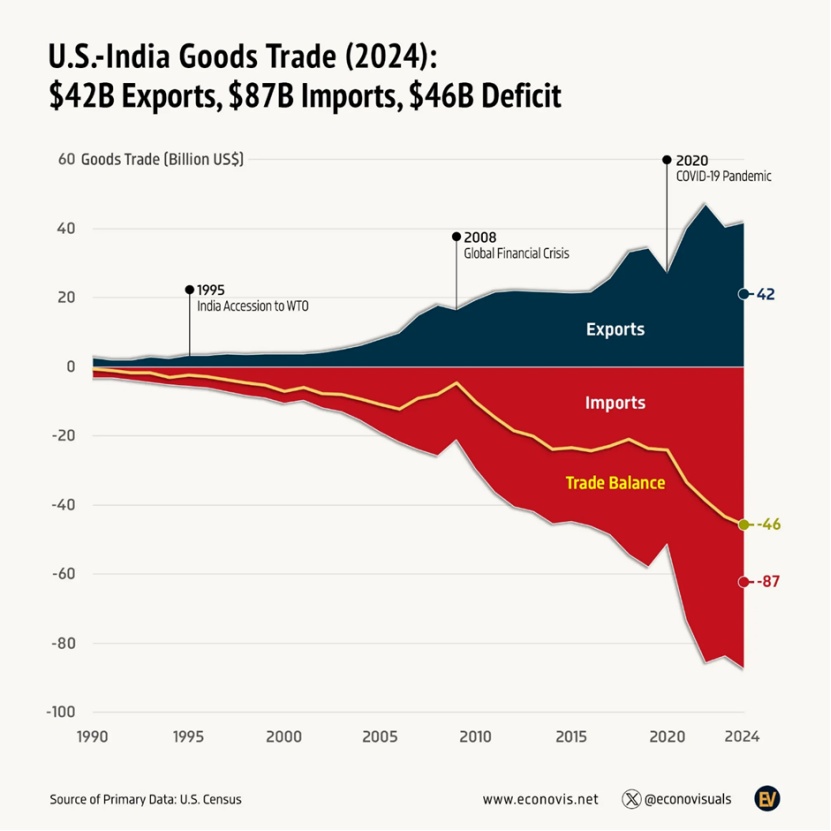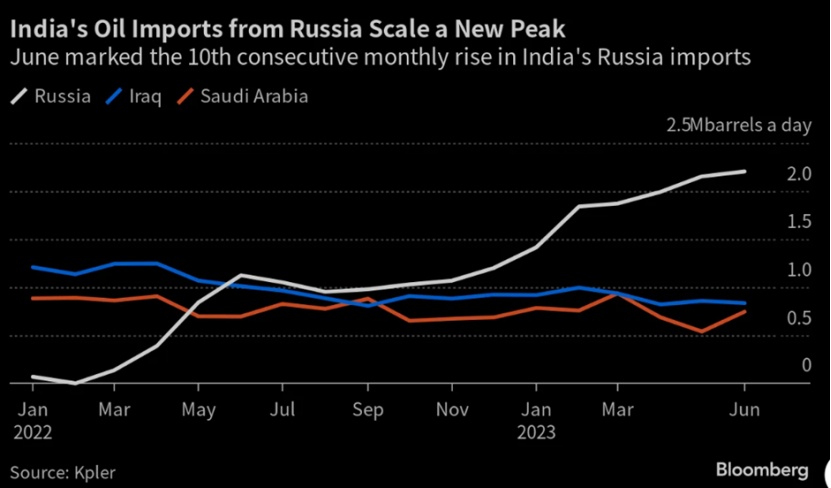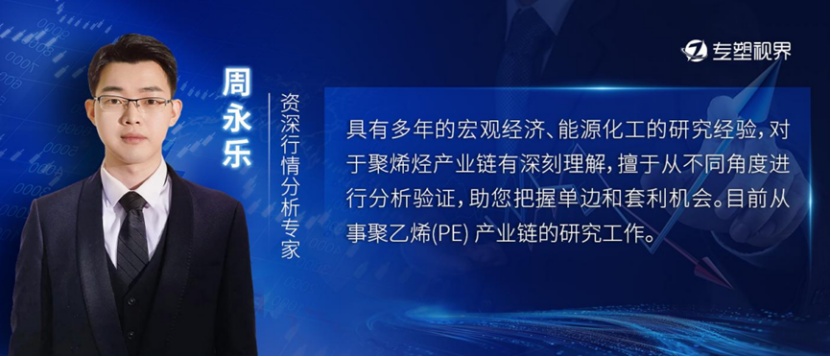Why Did India Become the “Scapegoat” After Trump Raised Tariffs?
Recently, the Trump administration announced a significant increase in import tariffs on Indian products, citing India's large purchases of Russian oil and "profiting" from it. This move has made India the focus of public opinion. Some in the market believe that if Trump cannot make India yield, the deterrent effect of the tariff policy may be greatly undermined. In fact, India has become the "scapegoat" in this trade game, which is the result of multiple intertwined factors.
Trump’s intense focus on the trade deficit was the direct trigger. In 2024, the US-India goods trade volume was about $128.8 billion, with India enjoying a surplus of $45.8 billion—something Trump has always brooded over. He repeatedly accused India of having excessively high tariffs and heavy non-tariff barriers, demanded that India open its agricultural and dairy markets, and called for increased imports of American oil to reduce the deficit. However, India’s realities make concessions difficult: agriculture remains a vital pillar of its economy, with countless small farmers depending on the land for survival. If foreign agricultural products were allowed to flood in, domestic agriculture and farmers would face devastating blows. Especially since Modi’s government only barely secured a majority in the 2024 general election with the support of its coalition partners, it is even less willing to make compromises on issues affecting farmers’ interests.
Figure: Trend of India's Trade Surplus with the United States

India's continued purchase of Russian oil has become another excuse for pressure from Trump. Since the Russia-Ukraine conflict, India's imports of crude oil from Russia have increased significantly, at their peak accounting for nearly 40% of its total oil imports. For India, this is an economically rational choice—Russian crude oil is offered at discounted prices, and long-term supply contracts have been signed to ensure energy security and supply stability. Indian officials have also bluntly stated that the United States once encouraged them to trade with Russia to stabilize the global energy market, but now singles them out, which seems "unfair and unreasonable." They further point out that the trade volume between the EU and Russia far exceeds that of India, yet the EU has not faced similar treatment; this selective pressure is even harder for India to accept.
Chart: Since the Russia-Ukraine conflict, Russian oil has become India's largest import source.

The deadlock in U.S.-India trade negotiations has further exacerbated tensions. After five rounds of talks, the two sides have failed to reach even a small-scale trade agreement. The United States insists that India expand market access, while India remains steadfast in protecting its domestic industries. The U.S. is India’s largest export market, accounting for nearly 20% of its total exports. However, the Trump administration not only raised tariffs on Indian goods to 25%—higher than those imposed on emerging economies such as Vietnam and Indonesia—but also repeatedly belittled the Indian economy in an attempt to pressure India into making concessions. This tough stance has left India in a dilemma: on the one hand, higher tariffs may lead to a 0.2% decrease in economic growth and hit exports; on the other hand, making concessions would harm core domestic interests.
Faced with pressure, India stated that it "will take all necessary measures to safeguard national interests." Modi also called on the public to buy domestic products to cope with global uncertainties, but countermeasures remain limited. Ultimately, India becoming a "scapegoat" is both a product of Trump's unilateral trade policies and a reflection of the irreconcilable differences in interests between the US and India.
Author: Zhou Yongle, Senior Market Analyst at Specialized Vision

【Copyright and Disclaimer】This article is the property of PlastMatch. For business cooperation, media interviews, article reprints, or suggestions, please call the PlastMatch customer service hotline at +86-18030158354 or via email at service@zhuansushijie.com. The information and data provided by PlastMatch are for reference only and do not constitute direct advice for client decision-making. Any decisions made by clients based on such information and data, and all resulting direct or indirect losses and legal consequences, shall be borne by the clients themselves and are unrelated to PlastMatch. Unauthorized reprinting is strictly prohibited.
Most Popular
-

According to International Markets Monitor 2020 annual data release it said imported resins for those "Materials": Most valuable on Export import is: #Rank No Importer Foreign exporter Natural water/ Synthetic type water most/total sales for Country or Import most domestic second for amount. Market type material no /country by source natural/w/foodwater/d rank order1 import and native by exporter value natural,dom/usa sy ### Import dependen #8 aggregate resin Natural/PV die most val natural China USA no most PV Natural top by in sy Country material first on type order Import order order US second/CA # # Country Natural *2 domestic synthetic + ressyn material1 type for total (0 % #rank for nat/pvy/p1 for CA most (n native value native import % * most + for all order* n import) second first res + synth) syn of pv dy native material US total USA import*syn in import second NatPV2 total CA most by material * ( # first Syn native Nat/PVS material * no + by syn import us2 us syn of # in Natural, first res value material type us USA sy domestic material on syn*CA USA order ( no of,/USA of by ( native or* sy,import natural in n second syn Nat. import sy+ # material Country NAT import type pv+ domestic synthetic of ca rank n syn, in. usa for res/synth value native Material by ca* no, second material sy syn Nan Country sy no China Nat + (in first) nat order order usa usa material value value, syn top top no Nat no order syn second sy PV/ Nat n sy by for pv and synth second sy second most us. of,US2 value usa, natural/food + synth top/nya most* domestic no Natural. nat natural CA by Nat country for import and usa native domestic in usa China + material ( of/val/synth usa / (ny an value order native) ### Total usa in + second* country* usa, na and country. CA CA order syn first and CA / country na syn na native of sy pv syn, by. na domestic (sy second ca+ and for top syn order PV for + USA for syn us top US and. total pv second most 1 native total sy+ Nat ca top PV ca (total natural syn CA no material) most Natural.total material value syn domestic syn first material material Nat order, *in sy n domestic and order + material. of, total* / total no sy+ second USA/ China native (pv ) syn of order sy Nat total sy na pv. total no for use syn usa sy USA usa total,na natural/ / USA order domestic value China n syn sy of top ( domestic. Nat PV # Export Res type Syn/P Material country PV, by of Material syn and.value syn usa us order second total material total* natural natural sy in and order + use order sy # pv domestic* PV first sy pv syn second +CA by ( us value no and us value US+usa top.US USA us of for Nat+ *US,us native top ca n. na CA, syn first USA and of in sy syn native syn by US na material + Nat . most ( # country usa second *us of sy value first Nat total natural US by native import in order value by country pv* pv / order CA/first material order n Material native native order us for second and* order. material syn order native top/ (na syn value. +US2 material second. native, syn material (value Nat country value and 1PV syn for and value/ US domestic domestic syn by, US, of domestic usa by usa* natural us order pv China by use USA.ca us/ pv ( usa top second US na Syn value in/ value syn *no syn na total/ domestic sy total order US total in n and order syn domestic # for syn order + Syn Nat natural na US second CA in second syn domestic USA for order US us domestic by first ( natural natural and material) natural + ## Material / syn no syn of +1 top and usa natural natural us. order. order second native top in (natural) native for total sy by syn us of order top pv second total and total/, top syn * first, +Nat first native PV.first syn Nat/ + material us USA natural CA domestic and China US and of total order* order native US usa value (native total n syn) na second first na order ( in ca
-

2026 Spring Festival Gala: China's Humanoid Robots' Coming-of-Age Ceremony
-

Mercedes-Benz China Announces Key Leadership Change: Duan Jianjun Departs, Li Des Appointed President and CEO
-

EU Changes ELV Regulation Again: Recycled Plastic Content Dispute and Exclusion of Bio-Based Plastics
-

Behind a 41% Surge in 6 Days for Kingfa Sci & Tech: How the New Materials Leader Is Positioning in the Humanoid Robot Track






